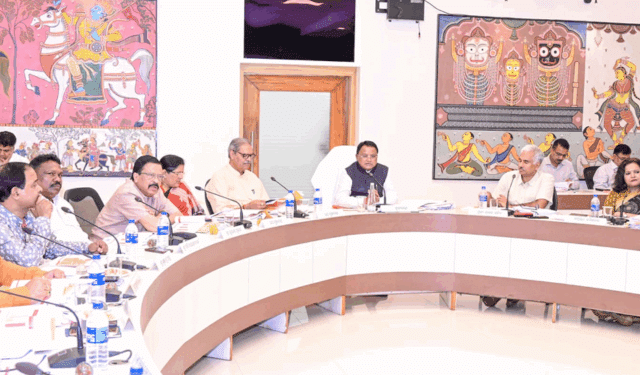The Odisha Cabinet has approved six major proposals aimed at paving the way for the State’s long-term strategic development.
In its latest meeting, the Cabinet also deliberated extensively on the “Odisha Vision Document 2036,” a comprehensive plan intended to map out Odisha’s developmental trajectory for the next decade.
The Vision Document 2036 seeks to address pressing challenges while steering the State toward sustainable growth. Key officials underscored the document’s significance in setting Odisha’s future direction and expressed optimism about its impact on governance and progress. Concrete strategies for implementation are still under discussion, and updates are anticipated in the coming weeks.
This forward-looking initiative marks a pivotal moment in Odisha’s quest for strategic and sustainable development.
Here are the highlights:
- Excise Rules Amendment to Boost Industry: The Cabinet sanctioned an amendment to Rule 79 of the Odisha Excise Rules, 2017, exempting extra hour operation fees for distilleries, bottling units, and breweries. This landmark decision is anticipated to enhance the ease of doing business in Odisha, fostering a favourable investment climate and creating new employment opportunities.
- Recruitment Reform for Excise Constables: To improve service management, the Odisha Lower Excise Service Rules have been amended to transition the Excise Constable cadre from divisional to district level. The restructuring promises smoother recruitment processes and better management of Excise Constables.
- Major Irrigation Project Progresses: The Cabinet approved a tender worth ₹108 crore for the Integrated Anandapur Barrage Project in Keonjhar district. The project includes constructing underground pipeline irrigation systems for the Baitarani Left and Right Bank Canals, benefiting over 3,450 hectares of cultivable land. This initiative aims to uplift the socio-economic condition of farmers in Anandapur and the surrounding blocks.
- Advancing Women and Child Welfare Services: The Odisha Children’s and Women’s Welfare Service Rules underwent a pivotal amendment, raising the minimum educational qualification for Anganwadi workers applying for Junior Grade positions from a high school pass to a graduation. Existing workers remain exempt from the new criteria, ensuring inclusivity while aligning recruitment with modern childcare needs.
- Restructuring Odisha Welfare Services: To address gaps in welfare scheme implementation, the Cabinet approved restructuring the Odisha Welfare Service and Odisha Subordinate Welfare Service cadres. This includes creating 24 new posts at various levels to strengthen coverage, especially for Scheduled Tribes, Scheduled Castes, and other marginalised groups.
- Phase-II Emergency Medical Ambulance Services (EMAS):The Cabinet has approved Phase-II of the Emergency Medical Ambulance Services (EMAS) for 2023-24 to 2027-28. With a budget of Rs 2,39,845.26 lakh, the scheme will cater to 11-12 lakh emergencies annually, ensuring timely medical support for pregnant women, children, and others. The service operates 866 ambulances, including ALS, BLS, and Boat ambulances, managed through a 24×7 centralised call centre. This initiative strengthens emergency healthcare access across Odisha.
These developments underscore the state government’s commitment to enhancing governance, infrastructure, and socio-economic growth. The reforms and projects collectively aim to make Odisha a hub of investment and holistic development.





























